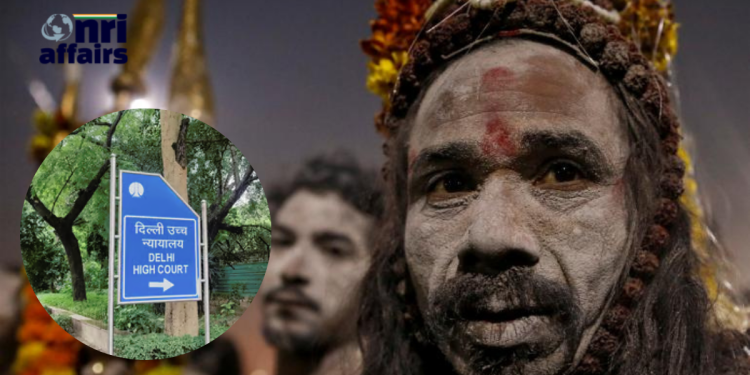In a landmark ruling, the Delhi High Court has clarified that Naga Sadhus, ascetic Hindu monks known for their renunciation of worldly possessions, cannot assert property rights in their name. This decision sheds light on the unique lifestyle of Naga Sadhus and the legal implications of their chosen path of detachment.
Naga Sadhus, also known as Naga Babas, are a prominent sect of sadhus in India who follow the Shiva tradition of Hinduism. Renowned for their distinctive appearance, adorned with ash, and carrying tridents, they lead a life of austerity and spiritual discipline, often residing in caves or ashrams in remote regions.
However, despite their ascetic lifestyle, Naga Sadhus have occasionally found themselves embroiled in legal disputes over land or property claims. The recent ruling by the Delhi High Court clarifies the legal status of such claims, emphasizing that Naga Sadhus cannot assert ownership rights over property in their name.
Justice Dharmesh Sharma, presiding over the bench, stated, “Naga sadhus are devotees of ‘Lord Shiva’ and are committed to leading a life completely detached from worldly affairs. Therefore, seeking property rights in their names does not align with their beliefs and practices.”
Represented by Advocate Kamlesh Kr. Mishra, Giri asserted that Mehant Shri Naga Baba Bhola Giri had the property since 1996. According to the Khasra Girdawari documents, the property, including the Shrine of Naga Baba Bhola Giri, was under the possession of his successor, Avinash Giri. Additionally, Giri argued that he had possessed the property well before the 2006 deadline set by the Delhi Special Laws Act.
The Delhi Development Authority (DDA), represented by Additional Standing Counsel Udit Malik, argued that the contentious property fell within the Revenue Estate Bela, designated as government land allocated to the Delhi Improvement Trust. This allocation was made under the Nazul Agreement dated March 31, 1937, predating the establishment of the DDA.
The court’s decision is rooted in the fundamental tenets of Naga Sadhus’ way of life, which prioritizes detachment from material possessions. As per Hindu tradition, renunciants like Naga Sadhus are expected to relinquish all worldly attachments, including property ownership, in pursuit of spiritual liberation.
Legal experts believe that the ruling sets a precedent for similar cases involving ascetic communities and underscores the distinction between spiritual pursuits and material possessions in Indian jurisprudence. It highlights the importance of respecting religious customs and traditions while adjudicating legal matters involving ascetic groups.
The ruling also offers insights into the challenges faced by Naga Sadhus in maintaining their chosen way of life in a rapidly modernizing society. As traditional landholding patterns evolve and urbanization encroaches upon rural areas, Naga Sadhus may find themselves increasingly vulnerable to land disputes and legal complexities.
Despite the legal implications, the decision reaffirms the enduring relevance of Naga Sadhus’ commitment to detachment and spiritual austerity. Their way of life serves as a poignant reminder of the impermanence of material wealth and the quest for transcendental knowledge.
In response to the court’s ruling, representatives of the Naga Sadhu community have expressed their commitment to upholding the principles of renunciation and detachment. They emphasize that their primary focus remains on spiritual pursuits rather than material possessions, echoing the timeless teachings of ancient Hindu scriptures.
The ruling also prompts broader reflections on the nature of property rights and the concept of ownership in Indian society. It invites a deeper inquiry into the intersection of religious beliefs, cultural practices, and legal frameworks, highlighting the complexities inherent in navigating the interface between tradition and modernity.
Moving forward, the Delhi High Court’s decision is likely to inform future legal proceedings involving ascetic communities and religious institutions. It underscores the need for a nuanced understanding of religious customs and practices in the context of contemporary legal discourse.
As Naga Sadhus continue to traverse the path of detachment and spiritual enlightenment, their way of life serves as a powerful testament to the enduring quest for transcendence in an ever-changing world. In honoring their commitment to renunciation, they offer profound insights into the nature of true wealth and the pursuit of inner peace.











